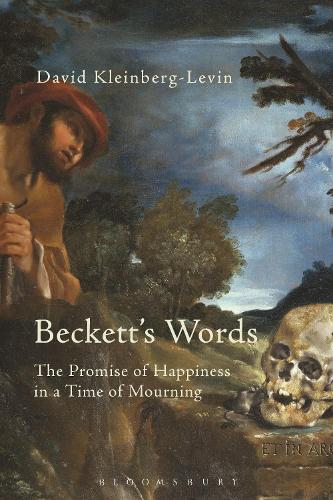
Beckett's Words: The Promise of Happiness in a Time of Mourning
(Hardback)
Publishing Details
Beckett's Words: The Promise of Happiness in a Time of Mourning
By (Author) David Kleinberg-Levin
Bloomsbury Publishing PLC
Bloomsbury Academic
30th July 2015
United Kingdom
Classifications
Professional and Scholarly
Non Fiction
Philosophy: aesthetics
Phenomenology and Existentialism
848.91409
Physical Properties
Hardback
328
Width 156mm, Height 234mm
635g
Description
At stake in this book is a struggle with language in a time when our old faith in the redeeming of the wordand the words power to redeemhas almost been destroyed. Drawing on Benjamins political theology, his interpretation of the German Baroque mourning play, and Adornos critical aesthetic theory, but also on the thought of poets and many other philosophers, especially Hegels phenomenology of spirit, Nietzsches analysis of nihilism, and Derridas writings on language, Kleinberg-Levin shows how, because of its communicative and revelatory powers, language bears the utopian "promise of happiness," the idea of a secular redemption of humanity, at the very heart of which must be the achievement of universal justice. In an original reading of Becketts plays, novels and short stories, Kleinberg-Levin shows how, despite inheriting a language damaged, corrupted and commodified, Beckett redeems dead or dying words and wrests from this language new possibilities for the expression of meaning. Without denying Becketts nihilism, his picture of a radically disenchanted world, Kleinberg-Levin calls attention to moments when his words suddenly ignite and break free of their despair and pain, taking shape in the beauty of an austere yet joyous lyricism, suggesting that, after all, meaning is still possible.
Reviews
By multiplying astute and original links between Becketts texts and a philosophical tradition moving from Kierkegaard to Adorno, from Kant to Derrida, and from Hegel to Agamben, Becketts Words demonstrates not so much that nothing is funnier than unhappiness, as Nell quips in Endgame, but rather that happiness remains a serious task for literature. If Becketts pointless waiting offers the paradigm of a paradoxical hope without hope, then Becketts words will never be dying words. Words of endless survival, they keep the promise for a beauty and a justice still to come. * Jean-Michel Rabat, Professor of English and Comparative Literature, University of Pennsylvania, USA. President of the American Samuel Beckett Studies Association *
To link Samuel Beckett and happiness in the same sentence without an intervening not is tantamount to heresy, the call of an apostate; yet the received wisdom of Beckett Studies is ripe for challenge, and Kleinberg-Levin obliges. From its opening pages, Becketts Words is marked by a freshness and erudition from a scholar who actively does philosophy. It is a welcome addition to the ongoing rethinking of Samuel Becketts work, especially of his philosophical inclinations and complexities. I would put Kleinberg-Levins work up against any of the critiques of Beckett and philosophy. * S. E. Gontarski, Robert O. Lawton Distinguished Professor of English, Florida State University, USA. Co-Editor, Journal of Beckett Studies *
Sets out to enrich our understanding of Beckett's philosophical relation to language from the perspectives of Walter Benjamin and Theodor Adorno ... One of the work's signal achievements is Levin's attention to philosophical energies less frequently discusses in Beckett studies. * The Year's Work in English Studies *
Author Bio
David Kleinberg-Levin is Professor Emeritus of Philosophy at Northwestern University, USA. His books include Gestures of Ethical Life: Reading Hlderlins Question of Measure After Heidegger (2005); Redeeming Words and the Promise of Happiness: A Critical Theory Approach to Wallace Stevens and Vladimir Nabokov (2012); and Redeeming Words: Language and the Promise of Happiness in the Stories of Dblin and Sebald (2013).
